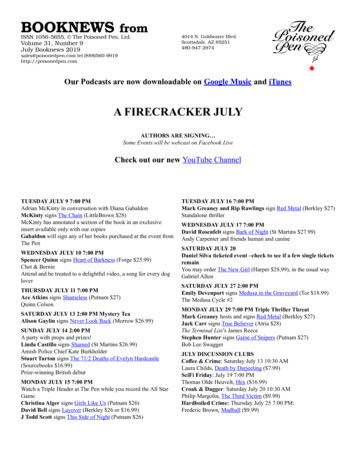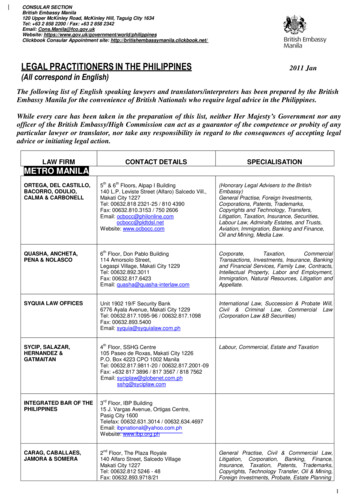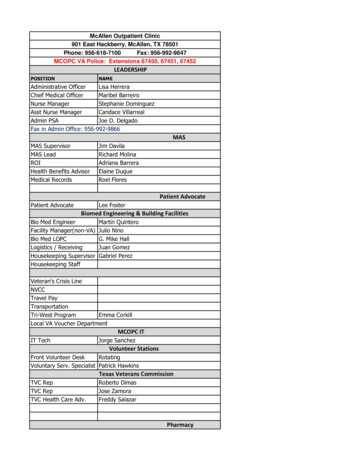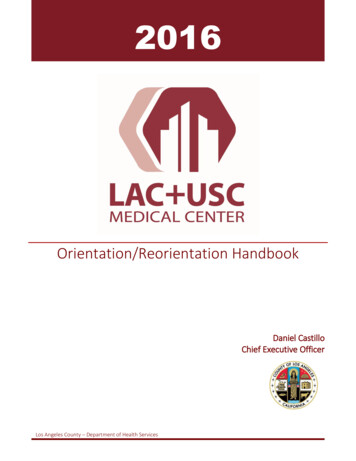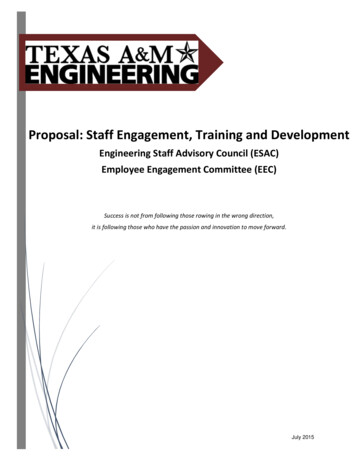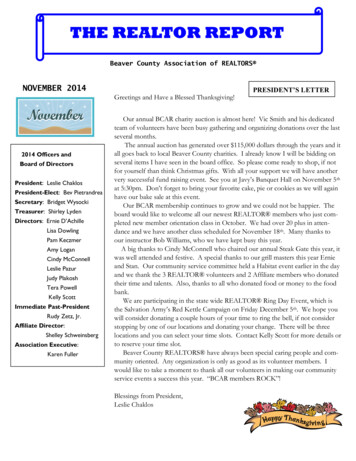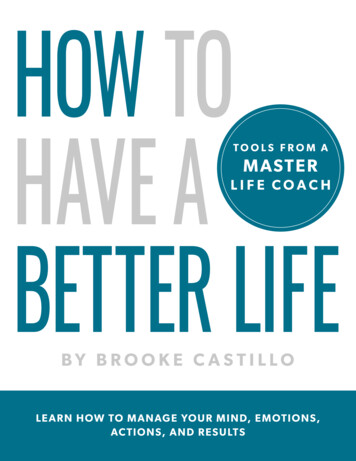
Transcription
TOOLS FROM A MASTER LIFE COACHHOW TO HAVEA BETTER LIFEL E A R N H OW TO M A N AG E YO U R M I N D, E M OT I O N S ,A C T I O N S , A N D R E S U LT S .BY BROOKE CASTILLO
ContentsIntroduction 7PA RT O N E What Holds Us Back: Common Obstacles to Success and How to Overcome Them 9Chapter 1: Fear and Failure 10What Is Failure? 11Why Fear of Failure Is a Problem 11The Root Cause of Fear of Failure: Unwanted Feelings 12How We Experience Failure Is Our Choice: An Example 13Want to Get Better at Failure? Practice! 13Refuse to Beat Yourself Up 14Why Failure Is Good 15Insights from My Self Coaching Scholars Class 15How to Embrace and Practice Failure 16Choose the Right Kind of Failure 17Don’t Sabotage Your Efforts 17A Note About Confusion 18Final Thoughts About Failure 19Fear 19Fear as the Result of a Mismanaged Mind 19Fear Usually Comes from Thoughts 20Fear’s Little-Known Secret 20Fear Should Serve You 21What Can We Do About Our Fears? 22Write Down Your Fears 25Final Thoughts About Fear 26
Chapter 2: Anxiety 27Anxiety as a Part of Life 27Anxiety Is Just a Feeling 28Physical Symptoms of Anxiety 28Responding to Anxiety 29Recognize It 30You’ve Named It: Now What? 30Final Thoughts on Overcoming Anxiety 37PA RT T WO How to Uncover and Address Two Commonly Hidden Obstacles 38Chapter 3: The Blame Game 39Not a Weakness: Just a Belief Pattern 40Indicators of the Victim Mentality 40Every Victim Needs a Villain 41One Indiscreet Remark: Two Opposite Reactions 42Rising Above Careless Actions vs. Being a Doormat 43Your Negative Emotions Are Due to Your Own Thoughts 44Recognizing and Overcoming the Victim Mentality: A Real Example 44Vulnerability: A Replacement for the Victim Mentality 45Strength Through Vulnerability 47Vulnerability and Weight Control 47You Are Enough 49Chapter 4: Lack of Confidence 50Self Coaching Practice and Introspection 50Why Successful People Experience Self Doubt 51Identify Your Self Doubt 52How Do You Perceive Obstacles? 53Doubt Your Doubt, Not Your Goals 54Try Fifty Things 55
Entitlement vs. Effort 57Note: Don’t Focus on the Past 58You Can Leave a Legacy 58PA RT T H R E E Emotional Maturity: What It Is and How to Achieve It 60Chapter 5: Emotional Adulthood 62Emotional Childhood 62Emotional Adulthood 64Examples of Emotional Childhood 64What Emotional Adulthood Looks Like 66How Emotional Childhood Affected My Weight 68Find Your Emotional Child 69Chapter 6: Healthy Thought Management 70Healthy Thought Management Means Being Mindful of One’s Mind 70Choosing to Manage Thoughts Doesn’t Mean Avoiding Them 73Transitioning from Negative to Neutral Thoughts 74Important Points About Thought Management 75Transitioning to Positive Thought Management 77In Summary 79PA RT FO U R Using Self Coaching to Solve Problems 80Chapter 7: How to Solve Any Problem 81Step One: Identify a Problem 81Step Two: Ask Yourself Why It’s a Problem 84Step Three: Evaluate Your Reaction 86Step Four: Do the “Manual Work” 87Step Five: Be in Charge of You 90Step Six: Change Your Thinking About the Past 90
Chapter 8: The Self Coaching Model 93Circumstances 95Thoughts 95Feelings 96Actions 96Results 96How the Model Works 96Put It on Paper 99Fill in the Blanks 102Moving Toward Change 103Choose Your Thoughts Carefully 104Finish the Model 105Be Curious and Compassionate with Yourself 105Watch for Patterns 106Conclusion 109
IntroductionAre you generally happy with your life, but sometimes feelstuck or unmotivated? Maybe you’re looking for inspirationor encouragement in some areas. Or maybe you’re alreadyhighly motivated but are looking for some proven methodsor tools to bring you to that next level. If you’re familiar withmy work at The Life Coach School, then you know about themany benefits of life coaching—but did you know that youcan coach yourself? It’s true. Furthermore, the benefits ofcoaching yourself can sometimes outweigh those of hiringa life coach.What are some of those benefits? A big one is that your coach isalways with you. You never have to wait for an appointment or workaround your coach’s schedule, and you can work at whatever pace youwant. You also get to know your client (yourself) well, which has manyadvantages in addition to making you an effective coach. Anotherbenefit is that you get to enjoy your successes as both client and coach.Finally, if you’re the type who likes to help others, you can use whatyou’ve learned to help friends, family members, and coworkers whocome to you looking for advice.If this all sounds good to you, you’re probably wondering how it’spossible to self coach. First of all, I can assure you that it’s possible.I’ve been coaching clients for over a decade now. It has become mylife’s work. One of my goals as a life coach is to teach my clients how tocoach themselves. When they reach that point, I know that I’ve donemy job. I’ve witnessed it thousands of times. So not only do I knowit’s possible, but I’m also intimately familiar with methods and toolsthat work to teach self coaching. Because I’m so happy to see peoplecross that bridge over to self coaching, I’ve developed an exclusiveprogram that teaches people how to coach themselves. It’s calledSelf Coaching Scholars. This book is a taste of that program.www.TheLifeCoachSchool.com H O W TO H AV E A B E T T E R L I F E7
In these pages, I start out with the most common obstacles that peopleface, based on what I’ve witnessed over the years. Perhaps you’ll beable to relate to one or more of them. You’ll get to read about howI help my clients deal with these obstacles, and in doing so you willhopefully understand more about how life coaching works. Part Onecovers fear and anxiety—obstacles that are usually easy to recognizein oneself. Part Two covers the victim mentality and self doubt, whichare sometimes more difficult to uncover. The third part of the bookis about healthy thought processes and emotional maturity, and howlife coaching can help to identify where you’re at and help you getto where you want to be. The fourth and final part covers the selfcoaching techniques we use at The Life Coach School: How to SolveAny Problem and the Self Coaching Model. This last part is excitingbecause this is where you’ll learn how to put everything together andbegin to understand how to be your own life coach.With this book, I pour out my heart and my mind—and some of themost important things I’ve learned during my years as a coach—foryou. You’ll understand the inner workings of what a life coach does,and like those in my Self Coaching Scholars program, you’ll learn aboutsome of the ways we help our clients to become unstuck, to grow, andto thrive in life. My hope is that this will give you a good taste of whatself coaching can offer, meanwhile getting you started on reaching thatnext level, whether that’s in your personal or professional life or both.So go ahead and turn the page, and we’ll get started right now.8H O W TO H AV E A B E T T E R L I F E www.TheLifeCoachSchool.com
PA R T O N EWhat Holds Us Back:Common Obstaclesto Success and How toOvercome Themwww.TheLifeCoachSchool.com H O W TO H AV E A B E T T E R L I F E9
CHAPTER 1Fear and FailureI just wanted to let youknow that the ideas youshared about failing havetotally changed me andseveral of my leaders.We are taking moreopportunities to fail andloving it! This is totallygoing to change mybusiness.– SPENCERFear and failure—they have so much in common. Do youknow someone who says that failure is their greatestfear? Maybe that’s you. This self defeating mindset isunfortunately quite prevalent. Lots of people say to me,“I have a real fear of failure.” Even seemingly confidentpeople experience it. Fortunately, life coaches knowhow to teach people to overcome both fear and failure,and even use both to their advantage. My coachingstudents and I train our clients to do it all the time. Indoing so, we’ve come to see that our strategies work.With practice and observation, the ability to use failureand fear to one’s advantage becomes second nature.Regarding failure, there’s a lot of talk out there about how notto fail and how to succeed. I think there needs to be more talkabout failure and how to do it properly. That’s where I startwith my clients. So that’s what I’ll explain in the first part of thischapter. See if you can imagine yourself as both coach and clientas we take a good look at what failure is and why it’s so scary.I’ll show you how feelings (not facts) contribute to the fear offailure. You’ll also learn how to experience failure in a positiveway, and why this is good for you. Then we’ll move on to fearin general, because once you understand how inconvenientand detrimental the fear of failure can be, you can apply that tofear in other areas. Fear is a part of our lives. It can be a healthypart. But it’s often irrational. Do you know how to recognize thedifference? If not, I’ll show you. I’ll also show you that it can begood to acknowledge fear. Sometimes, taking action in spite ofyour acknowledged fear is one of the most powerful things that10H O W TO H AV E A B E T T E R L I F E www.TheLifeCoachSchool.com
C H A P T E R 1 F E A R A N D FA I L U R Eyou can do. In this chapter, you’ll learn about some of the particular ways that life coaches helpclients do that. Perhaps you’ll be able to apply what you’ve learned right away and experienceyour first successful endeavor with self coaching.WH AT I S FA I L U RE ?Let’s look at failure. More specifically, let’s look at how to fail. I’d say that most people don’t achievetheir dreams because they don’t want to fail. But they don’t ask themselves why they don’t want tofail. So when they say they have a real fear of failure, I ask them, “What does that mean? What areyou afraid of? What is a failure to you? Why are you afraid of it?” They respond, “You know what?I’ve never really thought about it that way.”As life coaches, we try to get to the root of all the issues. We don’t try to solve just the problems.We try to solve the causes of the problems. So as a coach, you’ll need to ask a lot of questions.I’ve found that one of the reasons people have problems is because they don’t understand whatthe problems are. When it comes to fear of failure, the first thing to do is to understand whatfailure is. Ask Google (you know, the authority on everything) and it tells you that failure is“The omission of expected or required action.” The omission of expected or required action:I love this definition of failure. But it doesn’t quite encapsulate what we experience.WH Y FE AR OF FA I L U RE I S A P RO B LEMTo explain failure as just not doing our expected action, or as someone else not doing our expectedaction, seems so benign. “There was an omission of action on either my part or your part.” That’swhat we call failure? Well, that’s not a big deal, right? It’s just something that didn’t turn out theway we had expected.Or is it more than that?I’ve found that what most people do is stop expecting, so they never have a chance to fail.They keep their expectations low. They just keep recycling the same life. They never go outsidetheir comfort zone, and then they never have to deal with not meeting an expectation. I thinkthat’s such a shame.So many of the clients that I talk to don’t feel alive anymore because they’re not putting themselvesout there. They’re not putting themselves out there because they’re afraid, and they don’t want tofail. Fear of failure seems safe and harmless, but it keeps us from thriving—from living how we’remeant to live. And that’s no way to live.www.TheLifeCoachSchool.com H O W TO H AV E A B E T T E R L I F E11
C H A P T E R 1 F E A R A N D FA I L U R ET H E RO OT C AUSE O F FEA R O F FA ILUR E:U N WA NTED FEELING SI have spent two years inthe hospital and was toldI would never walk again.My expectation is to walkagain, but I might fail.If you have a fear of failure, a life coach can help you understandI am getting stronger,and little victories alongthe way are encouraging.expectation, then what’s going to happen is that you’re going toI need to be willing to fail.I can stand.why you’re afraid of failure by asking questions that you mightnot have considered. I work with clients all the time in an attemptto understand these primary questions: “Why are you avoidingfailing?” and “What is the reason you’re avoiding failing?” It alwaysboils down to avoiding a feeling. If failure means not meetingyour expectation or not taking the required action to meet yourthink some thought that’s going to create a negative emotion.The real reason why we’re avoiding “missing the mark” or “notmeeting our expectation” is because we don’t want to feel whatwe’re going to feel when that happens.Here’s what’s interesting about that: When you don’t meet your– AN N Eexpectation, the only feeling you’re going to end up having is basedon what you decide to think. You set out to do something, youhave an expectation of the result, and you miss that expectation.At that point, you get to decide what you’re going to make thatmean. You get to decide what you’re going to think about that.If you think about that in a way that hurts your feelings—if youthink about that in a way that’s disappointing—then you’re goingto experience that negative emotion.Ironically, the whole reason you’re avoiding failing is that you’reavoiding something that you have complete control over. Thatsomething is your reaction to failing.Stay with me here because this is important: You’re avoidingsomething you are in charge of and acting like it’s happening toyou. Most people tell me that failure happens to them, and thenthey have to experience it, but that’s not the truth. What happensis we miss our expectation, and then we decide to make it meansomething that hurts. We decide to make it mean something thatcauses us a negative emotion.12H O W TO H AV E A B E T T E R L I F E www.TheLifeCoachSchool.com
C H A P T E R 1 F E A R A N D FA I L U R EH O W WE EX P E RI E NCE FA I L U RE IS O UR C HO IC E: A N EX A MPLEWhen we don’t meet our expectations, we can decide to make that mean the end of the world,or we can decide to make that mean something positive. In making it positive, we won’t be dreadingexperiencing that very thing that we create for ourselves, which is the negative emotion. I knowthat this sounds interesting in theory, but in case it’s not clear, I’m giving you an example.Let’s say I set up a class, and I start marketing it. I want to have ten people attend. I’m excited aboutthe class, but only six people sign up. Then I start a negative dialogue: “What a fail! Only six peoplesigned up. I shouldn’t even teach this class. People don’t want what I have to offer. I’m not good atthis, and I’m never going to do this again. This feels so terrible!”The reason it feels terrible is that I’m making it mean that there’s something wrong with me—that I’m not any good at this. The “fail” is only awful because I’m making it awful. And so I startavoiding something that I’m the cause of, without realizing that I am.Alternatively, I could set up a class and say, “I want to have ten people in the class.” But if sixpeople show up, I could be like, “Hey! Awesome! Six people want what I have to offer.” I didn’tmeet my expectation. I didn’t get the ten people I had wanted. However, I got six, and I can moveforward from there.WA N T TO G E T B E T T E R AT FA I L U R E? PR AC TIC E!If you go back to the definition, failure is the omission of expected or required action. I lovethinking about it that way. I say to myself, “I merely didn’t do something. The reason that only sixpeople signed up for my class was simply because of an omission of action on my part. I can do itdifferently next time.”When I think about it that way, the failure experience doesn’t feel so bad. It makes me want tolearn and grow and try it again. Can you see that I’m the one that’s determining how failure willaffect me? I’m deciding what to think when I don’t meet my expectation.Success is one of those things that’s acquired by failure and by being willing to fail. There’s awonderful quote that goes, “If you want success, you need to double your rate of failure.” I believein that because I think that the better you get at failing, the more willing you’re going to be to doit, the more you’re going to learn, and the better you’re going to get at meeting your expectations.I believe this, and I’ve seen it happen in myself and my clients.www.TheLifeCoachSchool.com H O W TO H AV E A B E T T E R L I F E13
C H A P T E R 1 F E A R A N D FA I L U R ER E FUS E TO B E AT YOU RSE L F U PIf failure is not meeting your expectations, then success is meeting your expectations. The bestway to meet them is to practice, and in doing so, to make a lot of mistakes and learn what doesn’twork. So, when you focus on why you didn’t meet your expectations, and when you think abouttaking action in that way, then you’re not dwelling on the fact that you failed. Instead, you’refocused on what you need to do to succeed.Sometimes people say to me that they’re perfectionists. They’ll say, “I just want to do it all right,and I’m not willing to do it if I can’t do it perfectly.” I have a sense about perfectionism. I thinkperfectionism is for scared people because it gives them an excuse to not take action, to not putthemselves out there, and to not meet their expectation. Why the excuse? They know that they’regoing to beat themselves up if they fail to meet their expectation.If, instead of requiring perfection, you were to make a deal with yourself and say, “Hey, I’m goingto go out there and just try and do this, even though I might not do it perfectly,” there’s a definitechance that you’re not going to meet your expectation. You’re going to fail, and it might happenmany times, but here’s the thing—when you fail this time, you’re going to have your own back.You’re going to treat yourself with respect, and you’re going to honor yourself. You’re going to useit as an opportunity to learn and to take care of yourself. You’re going to use it as an opportunityto love yourself more instead of loving yourself less. You’ll refuse to say mean things to yourself,to beat yourself up, or to quit when you don’t meet your expectation.If you set yourself up this way ahead of time, before you start any action, you’re going to be muchmore willing to take action. Not only will you be more willing to take action, but you’ll be morewilling to take the risk that most success requires. To put yourself outside of your comfort zone andto try something you haven’t done is pretty risky. What are you risking? Failure. You could fail, but ifyou know that you’re going to take care of yourself if you fail, you’re going to be much more willingto do it. If you’re much more willing to fail, you’re going to double your rate of failure—maybe tripleit. And in doing so, you’re going to have a much higher chance of ultimately achieving success.14H O W TO H AV E A B E T T E R L I F E www.TheLifeCoachSchool.com
C H A P T E R 1 F E A R A N D FA I L U R EWH Y FA I LU RE I S G OODA Timeless ExampleLet’s look at the benefits of failing. Although it’s a bit overused, I love the example of little childrenlearning how to walk because they endure some epic fails. It is not pretty. The poor things bitethe dust multiple times before they get across a room. What’s fascinating, and what I love aboutit, is the mechanics. One of the reasons that they’re not walking well is because they don’t havethe strength. They have to push themselves back up, and that pushing themselves back up is whatgives them the strength to eventually be able to walk. If they stopped trying to walk because theywere failing, then they would never have the opportunity to get strong enough to be able to walk.It’s through the failing, through the falling down, that they get strong enough to do it. I just thinkthat’s brilliant.IN S I GH T S F ROM MY SE L F COACHING SC HO LA R S C LA SSOnce, in a Self Coaching Scholars class, we were talking about this idea of confidence, about howwe defined confidence, and about where confidence originates. I explained that one way I view it isas a willingness to fail in front of other people. We talked about how most people want to get theirconfidence from their past. They want to say, “I’ll be confident at something after I’m competentat it.” We considered the pouring of a glass of water and how we feel very confident when we’repouring a glass of water because we’ve done it so many times. We know that we’re very good at it.If we spill or we miss the glass or knock it over, we don’t consider that a failure. We don’t make itmean anything negative, and so we’re willing to do it because it’s not a big deal if we fail. We knowwe’re not going to quit and never try to do it again.How is it possible to feel that same sense of confidence with something that you’ve never done?In the class, we determined that you have to find confidence in your future. But how do you findconfidence from your future when you’re starting out or doing something you’ve never donebefore? You find confidence by recognizing that you risk failure with everything that you’re goingto be doing. Your confidence has to come from your ability to fail, from knowing that you’re notgoing to give up, and from knowing that you can fail and get better—and get better every time.I like to try new things. I like change. I like putting myself out there on that leading edge of mycomfort zone. I’ve discovered that I like these things because I’m very willing to fail, and I’m willingto fail in front of other people. Failure isn’t just something you talk about after getting a low scoreon a math test. You have to consider failure as something you want to include in your life. It’s notsomething to avoid. It should be pursued and perfected.www.TheLifeCoachSchool.com H O W TO H AV E A B E T T E R L I F E15
C H A P T E R 1 F E A R A N D FA I L U R EOne of my students brought up this idea of believing in our capacity to learn, and instead of usingthe word “failure,” using the word “learning.” As Thomas Edison said, “I have not failed ten thousandtimes. I have not failed once. I have succeeded in proving that those ten thousand ways will notwork.” That’s exactly how we can look at our failures. They’re opportunities for learning. We didn’ttake the type of action that was necessary for the results we wanted, so we just need to adjustthat and change it until we meet our expectation. Think about failure in a way that’s positive. Thinkabout it as something to move toward, instead of as something to move away from.I like the idea of failure as being a skill that we develop. If we’re good at falling down, we learn howto fall down well, and it’s not so scary anymore. I was so excited when I was talking to my classabout this. All of us got into it because the idea that failure can be something that we embrace isexciting. It got us thinking about the future instead of avoiding it so much. “You get good at failureby doing it often.” It’s a good sign if that thought tickled your mind as much as it did ours. It’s whereI try to get my clients. When they reach that point, we then get to work at how they’ll weave thepractice of failure into their lives.H O W TO EM B RACE A ND P RACTIC E FA ILUR EMaking Failure a GoalRamit Sethi is one of my favorite mentors. He has a website called, “I Will Teach You to Be Rich.” I’mdefinitely not in his target market, but I love him. He’s hilarious and kind of defiant and rebellious.One of the things he talks about that was a game changer for me is that he has a file on his computerthat he wants to add five failures to each month. If he’s not failing epically five times per month,he’s not working hard enough.So I started doing it too. What it did for me was amazing. When I failed or did something that didn’twork, I didn’t do a big disappointment-regret-shame dance. Instead, I said to myself, “Oh, failurenumber one. I can put that in my file now.” It changed my whole perspective. I thought, “One faildown, four to go!” Ever since then, I’ve been accumulating fails like badges of honor. They makeme stronger. I’m getting so much better at failing, and I have much more confidence when I trynew things.As I explained, we choose how to feel about failure because we decide what to make it mean.I know that I’m not going to make it mean anything negative now. I’m going to make it mean, “Hey!A six out of ten.” I choose excitement, anticipation, and momentum toward the future because ofthe willingness that I now have to fail.16H O W TO H AV E A B E T T E R L I F E www.TheLifeCoachSchool.com
C H A P T E R 1 F E A R A N D FA I L U R EC H O O S E T HE RI G HT K I N D OF FAILUR EI want to be clear about one thing when it comes to failure: It’s important to separate failurefrom your comfort zone and to do it by taking risks. I want you to understand the importanceof experiencing failure that occurs from taking risks rather than experiencing failure by just notshowing up. What I mean by taking risks isn’t the same thing as taking chances that are dangerousto your physical health. I just mean opening yourself up to rejection.For example, you could try volunteering somewhere totally new, take woodcarving lessons,or take some type of class in a subject that doesn’t come easily to you. You could totally screw up.But more likely, you’ll make some mistakes because you’re out of your comfort zone, and you’lllearn from them.You could also just try talking to someone new at the grocery store, at a coffee shop, or at yourchild’s soccer game. You’re putting yourself out there, and you’re introducing yourself to someone.They could reject you. You could consider that a failure. Those sorts of things are outside of yourcomfort zone. You’re putting yourself out there, and you’re trying something new. You are thetoddler learning how to walk.These are the types of failure that I encourage my students to try. They’re the type we practice inthe Self Coaching Scholars program. They’re active types of failure—not passive types, which arefailures due to inaction. This is what we’ll look at next.D O N ’ T S A B OTAG E YOU R E F F ORTSFailure that comes from just not showing up—from inaction—comes from setting yourself upfor sabotage. That’s something I don’t want to encourage you to do. Here’s what I mean by that:Let’s take the example of the ten-person class. You put yourself out there initially. You offer a classand hope that ten people sign up. But only six people sign up, and then you lose your enthusiasm.You’re late to the class. You don’t prepare for it. You do a terrible job delivering it. You don’texude excitement. You don’t bother to share anything valuable. You’re just kind of like, “Blah.”You’re just not there.That kind of failure—that kind of sabotage—is not something you want to do. It’s a failure becauseyou omitted the required action—action that is well within your comfort zone to do. You just didn’tshow up for yourself, and you didn’t show up for your students. You have negative thinking drivingperformance that further proves you’ve “failed.” You’ve sabotaged your effort to teach the class.www.TheLifeCoachSchool.com H O W TO H AV E A B E T T E R L I F E17
C H A P T E R 1 F E A R A N D FA I L U R EHow can you avoid sabotage? Usually, the thoughts that drive it are: “There’s something wrongwith me. I’m not worth it. This isn’t worth it. Nobody’s going to like me. Why should I evenshow up?” I teach my students that when you find yourself in that cycle, you need to take a look atyour mind and find out what’s going on. It’s another invitation to tap into the work that you needto do ahead of time because it’s not something you want to repeat.People will often say, “The first time you make a mistake, it’s no big deal. You learn from it, butdon’t make the exact same mistake again.” That’s the same thing I would say about failure. If you dosomething and you don’t meet your expectation, and then try it again the exact same way and getthe exact same result, I would consider that as an example of “staying within your comfort zone”failure, failure by inaction, or self sabotage. That’s a different thing from the type of failure thatwill help you, so don’t repeat it. Failure, the way you want to do it, is putting yourself out there intothe unknown by doing something new. Do that, and you won’t regret it because you’ll gain usefulexperience and information from it.A N OT E AB OU T CON F U SI ONOccasionally, I point out something I see in my clients that causes them to say, “Oh my gosh, I hadno idea I was doing this!” Often, that “something” has to do with confusion. One of the ways weavoid failure is by being confused. We say we’re confused because we don’t understand how todo something. We say, “I don’t know.” This is a sneaky method of avoidance. Again, we’re afraid ofnot meeting expectations, and this is fear holding us back. So be careful. If you notice yourself nottaking action, and you’re telling yourself the reason you’re not doing it is that you’re undecided,you don’t know, or you’re confused, just know that that’s the easiest way to fail ahead of time.So try to understand your motivations for inaction. Pay attention. Have a look at that becausewhen you avoid failure, you’re avoiding success. Being confused, saying “I don’t know,” and beingundecided is just a way of hiding. Be real about it.Regarding confusion, I never say to myself that I don’t know how to do something. It doesn’t serveme to say that. What I say is, “I’m figuring out how to do something,” “I’m going to find out how todo something,” or “I’m learning the steps to understand this.” Saying it in that way doesn’t paralyzeme. It keeps me going. I don’t say, “I don’t know,” I say, “I’m figuring it out.” I don’t say, “I’m undecided,”I say, “I’m going to decide.” There’s no right decision, so when I make a decision, I’m willing for it tobe the wrong dec
a life coach. What are some of those benefits? A big one is that your coach is always with you. You never have to wait for an appointment or work around your coach’s schedule, and you can work at whatever pace you want. You also get to know your client (yourself) well, which has many ad

